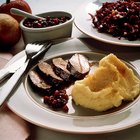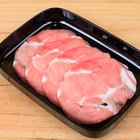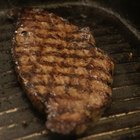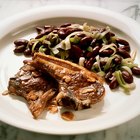Lisovskaya/iStock/GettyImages
Lean cuts of lamb may be low in fat and an alternative to other red meats, but not everyone likes the gamy taste. A good marinade made with wine or vinegar removes much of the gamy flavor and tenderizes the meat. Don’t use straight vinegar, or you may find the vinegar flavor overwhelms the meat. For larger cuts, it will take several hours or more of marinating to penetrate the meat, while small cuts, such as chops, benefit from shorter marinating times.
Marinating Lamb
Pure vinegar is too strong for marinating lamb, so try a marinade of flavored vinegar or wine, olive oil, rosemary, garlic and other herbs to remove gaminess and add desirable flavors. Refrigerate the meat in a plastic bag or container, completely covered with marinade. Chops, lamb cubes and stew meat need at least two to four hours and up to two days marinating time. Large cuts, such as leg of lamb and roasts, benefit from two to five days marinating time. If you don't have several days, the lamb will still benefit from a short time in a marinade. Cook marinated lamb to a minimum internal temperature of 145 degrees Fahrenheit.
Related Articles

How to Soak Deer Meat in Baking Soda
Can I Use White Vinegar to Tenderize ...

Can You Marinate a Pork Shoulder ...

How to Cook the Neck of a Deer

How to Make a Venison Rub

How to Cook Pork Hamonado

How to Cook Lamb Without It Smelling Bad

Perfect Way to Cook a Pork Chop in the ...

How to Grill Rack of Lamb

How to Make a Juicy Pork Tenderloin

How to Cook Shoulder Lamb Chops on a ...

How to Tell If a Pork Roast is Done

How to Cook Duck Fillets

Does Chicken Go Bad if You Marinate It ...

How Long Should Steaks Rest After ...

How to Cook Carolina Pulled Pork With ...

Cooking Instructions for Lamb Chops

Why Do Pork Chops Turn White?

Shank Ham Cooking Directions
Easy Pork Chop Marinade Recipe
References
- U.S. Department of Agriculture Food Safety and Inspection Service: Lamb From Farm to Table
- Marinades, Rubs, Brines, Cures & Glazes; Jim Tarantino
- What's Cooking America: Marinating Meat Guidelines
Writer Bio
Diane Watkins has been writing since 1984, with experience in newspaper, newsletter and Web content. She writes two electronic newsletters and has a Bachelor of Science degree in chemistry from Clemson University. She has taken graduate courses in biochemistry and education.